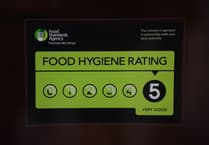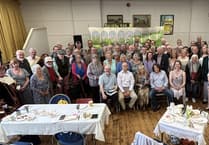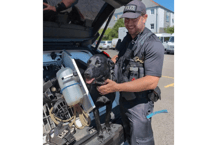A new kind of therapeutic intervention for veterans is coming to Cornwall.
The Hugs Foundation has been active in Bodmin since March 2017. At its base at Higher Whitley Farm, around 35 rescued horses and ponies are undergoing assessment and rehabilitation.
Nearly all of these animals will be rehomed but whilst they are on their journey to recovery, from whatever ill-fortune they may have suffered, Hugs has developed an intervention which creates a circular relationship between the animals and the people they support. Both are involved in care and therapeutic intervention of each other, creating a holistic space for healing, support and establishing trust so they can all live a fulfilling life.
Interaction with horses has been scientifically evidenced to reduce depression, anxiety and PTSD symptoms, increase social inclusion, help reconnect and build relationships and enhance well-being. Some of the ponies are even taken to visit residents of care homes who cannot travel to the Hugs rescue centre, giving hope, purpose and happiness to residents lives and helping reduce social isolation.
Equine assisted interventions (EAI) is the umbrella term for interventions in which equines are used in different contexts such as therapy, learning new skills and growth to self-actualisation for participants or clients suffering mental health problems. This can include; experiential therapy, where the horses are loose in an area and act as metaphors to participants, activities on the ground such as setting boundaries, learning to ride to improve confidence and learning how to care for the horse.
Now this alternative therapeutic intervention is being offered at Hugs to veterans who have served in the armed forces and are finding it difficult to transition into civilian life. Compared to the general UK population, there is an increased likelihood that veterans will experience mental ill health due to experiencing combat situations, exposing them to traumatic events and stressors. In the last eleven years, mental health disorders of serving military personnel and veterans have increased by 78% in the UK. Around one in twenty veterans will suffer from PTSD in the UK, 41% of UK veterans have felt lonely and isolated, with 23% struggling to relate to civilians.
Military culture consists of a different set of values and beliefs to civilian culture, including an increased sense of purpose and direction, instilled strength both mentally and physically, a sense of unity and a bond with comrades, not easily replicated in the civilian world. This culture, along with years of negative outlooks on mental health, creates stigma, making it difficult to seek help. These struggles can lead to veterans experiencing feelings of isolation, confusion with social identity and lack of belonging. Consequently, veterans may become withdrawn from family and friends, leading to additional problems including mental ill health in family members, substance dependency and employability issues. When symptoms emerge, veterans are unsure who to turn to and often lack trust in statutory bodies or don’t want to admit they need treatment for mental ill health, due to stigma. Military mental health cases are often complex, requiring longer-term treatments, which puts more demand on resources and money and often have high dropout rates. Therefore, alternative interventions, that enable the breakdown of barriers, improve the mental health and well-being of serving military personnel and veterans and help with transitions to civilian life and much needed.
The Hugs Foundation ran a pilot veteran’s well-being day last October in partnership with The Veterans Farm-Able Foundation charity. The positive feedback received has led to the planning of a collaborative project, which is currently ready to run as a pilot project, subject to successful funding bids.
The pilot project is hoping to run this spring (subject to government guidelines re covid) over a 6-month period, one day per month where Farm-Able will come to Hugs with a group of between three and six veterans who are suffering mental ill health, struggling with transitions from military to civilian or finding purpose in life.
Working alongside the Hugs rescue ponies, the veterans will be contributing to making positive changes to their lives, helping them rehabilitate and find their forever home and second chance. In turn, this will help the veterans to move on themselves, find a purpose in life and build relationships once again.
The aims include an increase in the participant’s general well-being, decrease in the symptoms of depression, anxiety and PTSD, create a sense of purpose and increase drive and enthusiasm for life. The veterans will find it easier to get involved, to trust other people, to be able to work alongside other people and to ask for help when it is needed, improving social isolation. The activities of the programme create a support network of civilians and peers for the veteran to experience and at the same time helping them come to recognise their own skills in coping with situations, whilst also benefitting the rescue animals on their journey to recovery. The Hugs team, human and equine, have an excellent reputation for making positive changes to people’s lives and they hope the effects of this project will be life-changing.
Hugs Foundation charity coordinator Laura Dennis said: “Alternative therapeutic interventions are much needed in the veteran and military community, as the facts and figures demonstrate. We are so pleased to be able to offer this pilot project in collaboration with the Veteran’s Farm-Able Foundation, after much research and planning. It’s a fantastic opportunity and we hope that it will be here for the long term and help many veterans change their lives for the better.”




